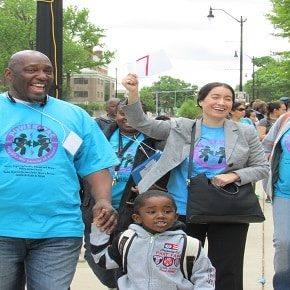Jennifer E. Cossyleon, Loyola University Chicago, works with Community Organizing and Family Issues (COFI), to examine how grassroots community organizing shapes parents’ lives. ASA asked Cossyleon about her work:
What is the mission of COFI? COFI is a Chicago-based organization with a state-wide reach. Its mission is to: strengthen the power and voice of low-income and working families at all levels of civic life—from local institutions and communities to the local, state, and federal policy arenas (www.cofionline.org). The organization supports parents through leadership trainings in local communities where parents set and accomplish personal, family, and team goals; develop relationships with each other and community partners; and join other communities of COFI parents (mainly through a parent-led group, Parents Organized to Win, Educate, and Renew Policy Action Council POWER-PAC) to collaboratively fight for systemic change on issues that impact their children and families. To support parents’ participation in trainings and organizing meetings, COFI offers childcare, English-Spanish translation, travel reimbursements, and free food and refreshments—all essential to the inclusion of often-excluded parents.
Could you describe the project? The project set out to better understand how community organizing is shaped by and shapes parents’ social and family lives. The policy accomplishments of COFI parents, largely African American and recent immigrant Latina mothers and grandmothers, are well-known by the organization and community. However, many of COFI leaders’ stories of personal and familial transformation through their community organizing remained untold. Through participant observations and one-on-one interviews, this project demonstrates how cross-cultural community organizing that supports the lives of parents can transcend the publicly stated goals of the organization and powerfully shape parents’ most intimate relationships. Findings from this research highlight the benefits of community organizing that helps to foster the innate leadership of parents. The accomplishments of parents fighting to improve their communities cannot be measured solely by the scope and size of their policy outcomes. Rather, it is immensely important for researchers and policy makers to recognize the ways in which civic engagement can provide the most vulnerable groups with power and the intergenerational tools to combat social inequality in all aspects of their lives. This type of family-friendly political engagement helps to ensure that often disenfranchised groups develop and maintain a voice in a society that often tries to silence them.
What sociological knowledge and/or skills did you use? Sociological literature helped us to understand how collective action is shaped by and shapes the intersecting identities of participants and the institutions that organize civic society. My skills as an ethnographer helped to document and illustrate how community organizing through the COFI model shapes the social lives of participants and the importance of their collective action beyond their vital policy impacts.
How did you connect with Community Organizing and Family Issues? I initially connected with COFI through Loyola University’s Center for Urban Research and Learning (CURL), where COFI had been a community partner for many years. COFI staff, along with a handful of other organizations, participated in a training series sponsored by the Chicago Foundation for Women, which I helped to coordinate at CURL (www.luc.edu/curl/). The training series was focused on helping community-based organizations who supported women and girls to increase their capacity to do research. COFI was interested in documenting the powerful stories of COFI-involved parents. We developed a research plan to help uncover how community organizing intimately shaped participants’ social lives and families beyond the policy goals and achievements of the organization.
How long were you involved? From February 2016 to the present, although the initial data collection occurred within a 15-month time frame.
Is there anything else you would like to share about this work? This community-engaged research project was a collaboration that included COFI from the start in the shaping of research questions, recruitment procedures, and the dissemination of initial findings. These methods aimed to ensure that the goals of the research spanned beyond academia and remained grounded in the knowledge of the community. This collaboration, along with ongoing report-backs built trust and motivation. COFI parents and staff said they appreciated reflecting on the importance of their work through the narratives collected in this study and how it further motivated them.
COFI and I plan to present findings at conferences and panels that have a broad reach to academics, policymakers, and community members. I am immensely grateful to COFI parents and staff for welcoming me into their lives and I look forward to future collaborations. I would also like to acknowledge the support I received from Loyola University’s Center for Urban Research and Learning, the Arthur J. Schmitt Foundation, and the Midwest Sociological Society.
